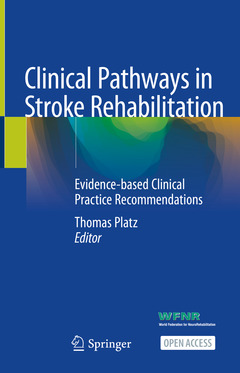Description
Clinical Pathways in Stroke Rehabilitation, 1st ed. 2021
Evidence-based Clinical Practice Recommendations
Coordinator: Platz Thomas
Language: English
Subjects for Clinical Pathways in Stroke Rehabilitation:
282 p. · 15.5x23.5 cm · Hardback
Description
/li>Contents
/li>Biography
/li>Comment
/li>
This open access book focuses on practical clinical problems that are frequently encountered in stroke rehabilitation. Consequences of diseases, e.g. impairments and activity limitations, are addressed in rehabilitation with the overall goal to reduce disability and promote participation. Based on the available best external evidence, clinical pathways are described for stroke rehabilitation bridging the gap between clinical evidence and clinical decision-making. The clinical pathways answer the questions which rehabilitation treatment options are beneficial to overcome specific impairment constellations and activity limitations and are well acceptable to stroke survivors, as well as when and in which settings to provide rehabilitation over the course of recovery post stroke.
Each chapter starts with a description of the clinical problem encountered. This is followed by a systematic, but concise review of the evidence (RCTs, systematic reviews and meta-analyses) that is relevant for clinical decision-making, and comments on assessment, therapy (training, technology, medication), and the use of technical aids as appropriate. Based on these summaries, clinical algorithms / pathways are provided and the main clinical-decision situations are portrayed.
The book is invaluable for all neurorehabilitation team members, clinicians, nurses, and therapists in neurology, physical medicine and rehabilitation, and related fields. It is a World Federation for NeuroRehabilitation (WFNR) educational initiative, bridging the gap between the rapidly expanding clinical research in stroke rehabilitation and clinical practice across societies and continents. It can be used for both clinical decision-making for individuals and as well as clinical background knowledge for stroke rehabilitation service development initiatives.
Preface
Dedication
AcknowledgementsChapter 1: Neurobiology of stroke recovery
Chapter 2: Clinical pathways in stroke rehabilitation
Chapter 3: Goal setting with ICF* and multidisciplinary team approach in stroke
rehabilitation
Chapter 4: Disorders of consciousness
Chapter 5: Airway and ventilation management
Chapter 6: Recovery of swallowing
Chapter 7: Arm rehabilitationChapter 8: Mobility after stroke - Re-learning to walk
Chapter 9: Post-stroke spasticity
Chapter 10: Rehabilitation of Communication Disorders
Chapter 11: Treating neurovisual deficits and spatial neglectChapter 12: Cognition, emotion and fatigue post stroke
Chapter 13: Driving after stroke
Chapter 14: Health care settings for rehabilitation after stroke
Thomas Platz was educated at the medical school in Heidelberg/Mannheim, Germany, and in 1988 at the Duke University Medical Center, Durham, NC, USA, received his Dr. med. degree in 1990. He started his residency in neurology in Berlin, Germany, in 1989. In 1995, he received the Feodor-Lynen Fellowship (AvH foundation) to stay at the Institute of Neurology, Queen Square, London, UK. In 1997, he received a Dipl. in epidem. and biostats from the McGill University, Montreal, QC, Canada, and became board certified Neurologist and Clinical Geriatrist in Berlin, Germany. In 2002, he received his habilitation degree (Dr. med. habil.) in neurorehabilitation at the Charite Berlin, Germany. In 2006, he became the Head of Department for neurohabilitation at the BDH Klinik Greifswald, Germany. Since 2009, he had been acting as a Medical Director of that hospital and as Head of the Department of both its Neurorehabilitation Centre and Spinal Cord Injury Unit, and received a personal professorship for neurorehabilitation at the University Greifswald. Since 10.2018 he acts as Medical Director Research and Head, Institute for neurorehabilitation and evidence basis, BDH Klinik Greifswald, An-Institute of the University Greifswald; in addition, he leads the neurorehabilitation research group at the University Medical Centre Greifswald. He is president of the German society for neurorehabilitation (DGNR). For the World Federation for NeuroRehabilitation (WFNR) he acts as head of the Education Committee and head of the Special Interest Group Clinical Pathways.
Provides evidence-based clinical practice guidelines for stroke rehabilitation
Discusses clinical problems and evidence, comments on assessment, therapy and technical aids
Written by experienced experts with a background in clinical practice
This book is open access, which means that you have free and unlimited access.




